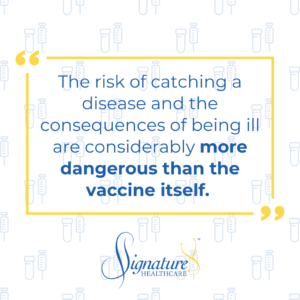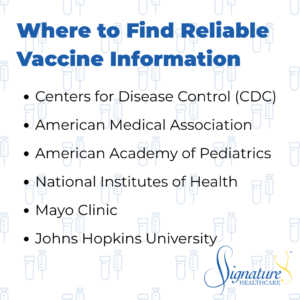The Importance of Vaccination: A Doctor’s Perspective on Protecting Your Health
Are vaccines safe? Are they risky? Do they have side effects?
The vaccine debate is more fevered than it’s ever been in my 30+ years as a physician, particularly online. If I could sit down with every North Carolinian who’s hesitant about vaccines, here’s what I’d tell them about the importance of vaccination:
Everything we do has a risk/benefit ratio, from participating in physical activity to taking medicine. Even the simplest actions have associated documented risk — getting on an airplane, driving to work, crossing the street, etc.
Medical treatments and vaccines are no different. But when it comes to vaccination risks and benefits, decades of data from millions of patients show that the vast majority of people benefit from vaccines.
In fact, the risk of catching a disease and the consequences of being ill are considerably more dangerous than the vaccine itself.
Most individuals feel fine and do well after they receive a vaccine. But as I tell my patients, most people don’t share good experiences online. Rather, we hear from a very small minority who may feel they’ve had some bad result from their inoculation.

Vaccination Risks and Benefits: Lessons From Measles and Polio
Measles
Medical science had once virtually eradicated measles. But today, the disease is circulating again because some individuals decline the vaccine.
In 2023, over 100,000 people died from measles worldwide. Sadly, most of them were children, the most vulnerable segment of the population.
And in recent weeks, a number of unvaccinated school-age children contracted measles in Texas, including one fatality.
Polio
Consider poliomyelitis — polio, as it’s commonly known — which peaked in the US in the 1940s and 50s. In one of every 200 polio infections, the virus caused irreversible paralysis; for some, the condition led to death if the breathing muscle was also paralyzed.
The introduction of the polio vaccine in 1955 dramatically decreased cases of polio — and today, with so many people vaccinated, it’s 99% eradicated. But choosing not to vaccinate your child against the disease may expose them to a lifetime of paralysis.
At Signature Healthcare, we respect personal convictions, and the choice is always yours. We also want you to understand how easily a child’s life may be lost, or severely affected, if they’re not protected against disease with a simple inoculation.
Our practice believes in the importance of vaccination. Protective vaccines are the right way to go, regardless of conviction or reliance on questionable information.
Vaccines Evolve as Needed
The CDC’s Advisory Committee on Immunization Practices (ACIP) meets three times a year to review evolving patient data, as well as changes in the diseases themselves, and makes objective recommendations based on current, accurate data and evidence-based medicine.
Committee members discuss whether evidence supports the benefit of a particular vaccine protocol. Then, the CDC issues vaccine recommendations with details on what demographics should receive them.
Two recent scenarios include:
The Respiratory Syncytial Virus (RSV)
The respiratory syncytial virus (RSV) vaccine is an FDA-approved vaccine that was initially recommended for kids, as well as adults 65 and up.
A year later, in its regular review, the ACIP found the vaccine didn’t notably benefit patients in their 60s. The committee subsequently narrowed their age recommendation for the RSV vaccine to include all seniors 75 and up, and only 60-to-74-year-olds deemed at serious risk of the disease.
The Pneumonia Vaccine
Interestingly, diseases often transform as various vaccines become available.
For instance, twenty years ago, a single type of pneumonia vaccine was administered to everyone. But over the last two decades, as patients became immune to that vaccine’s components, newly adapted strains of pneumonia entered the picture.
It’s a moving target: Once scientists eradicate certain strains of pneumonia, they must reformulate the vaccine to cover new ones that begin to circulate. And the cycle continues.
In the past 10 years, four new formulations of the pneumonia vaccine have been made available, tailored to various segments of the general population. Pneumonia is still a leading cause of death in older people, so it’s well worth preventing.
Serious Reactions Are Rare
Patients occasionally express concern about the safety of current vaccines, but a severe reaction to a vaccine is quite rare — likely far less than 1% of instances. While the actual percentage may vary between vaccines, a patient’s risk of serious illness is much higher than their risk of an adverse event from a vaccine.
Before the FDA approves a vaccine for public use, it undergoes clinical trials during which it collects data on reported side effects. Once a vaccine is brought to market, the CDC continues to monitor for possible adverse reactions.
No vaccine ever comes to market without being proven safe, nor would it stay on the market if adverse events occur.
Herd Immunity
Herd immunity means enough people are immune to a disease that the infection cannot spread significantly to others. Thus, the more vaccinated people, the less the disease can travel to non-immunized others.
Larger outbreaks — such as the recent measles outbreak among Texas kids — occur in communities where most of the population is unvaccinated.
Measles is highly contagious. Before they even know they have it, people can spread it for several days at the office, a party, or the grocery store. Once a person has symptoms, it’s responsible for them to stay out of circulation. But if they’re unaware they’re infected, they might unknowingly infect quite a few others.
That’s why we recommend our patients be proactive about getting vaccinated rather than waiting for herd immunity to occur.
The Choice Is Always Yours
Concierge practice allows us to have a close, trusted relationship with each of our patients, and we encourage you to bring us your questions about vaccines.
As a physician at Signature Healthcare, I work with adult patients. My role as your doctor is to share the facts.
You’re free to manage your health choices, regardless of whether it’s a decision to get vaccinated, take cholesterol medicine, or get a colonoscopy. Whatever medical treatment I recommend, you may choose to pass or play.
Our practice truly believes in the life-preserving benefits of vaccines, and I make sure each patient understands the potential consequences of whatever choice they make. If they’re willing to live with it, I’ve done my job.

Vaccination Education: Be Well-Informed
Don’t rely solely on social media for information about vaccination risks and benefits. If an anecdote shared on a social platform spurs your interest, ask your Signature Healthcare physician about it, and research the topic through trusted healthcare organizations.
We can refer you to reliable online resources from eminently trustworthy medical groups such as the Centers for Disease Control (CDC), American Medical Association, American Academy of Pediatrics, National Institutes of Health, Mayo Clinic, and Johns Hopkins University.
Keep in mind: Vaccination is much safer than getting the disease.
Reach out today. We’ll help you make a safe choice.

Dr. Elizabeth Perry
Dr. Perry is board-certified in internal medicine, holding a medical degree from the Medical College of Virginia. She completed residencies in internal medicine at the University of Pennsylvania Hospital and in emergency medicine at Johns Hopkins Hospital. Dr. Perry served as the chairperson of the Health Services Committee for the Charlotte Chamber of Commerce in 2006-07 and received the Charlotte Business Journal’s “Women in Business Achievement Award” in 2006. She, her husband Jon, and their three children enjoy outdoor activities and travel.

